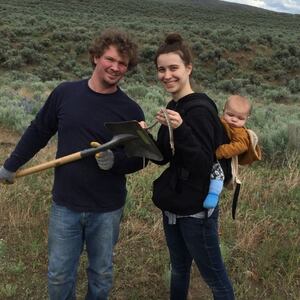PORTLAND—When Lucy Francisco of Medford, Oregon, learned that the Almeda fire had burned through two small towns and was racing toward her city, she didn’t wait to be evacuated.
She knew what to pack. She had a list on her phone, which she’d gone through again and again over the years. She and her husband grabbed their two young children, jumped in the car, and headed north.
“It was so smoky, I was literally crying, so scared we were driving into another fire,” Francisco told The Daily Beast.
They were: Fires outside of Eugene were blocking their path. So they pivoted for the coast. As the small family slept by the dunes in their car a few hours later, the city of Medford—82,000 people—was officially ordered to evacuate.
In 2017, Francisco and her family fled their house in Sonoma County, California, at 2 a.m. as flames crested a nearby hill. It was that experience that motivated her to move to Medford in the first place—a city she once saw as safe from natural disaster, only to realize there may be no escaping them anymore.
As wildfire season has grown longer and more destructive in recent years, some Californians migrated north in hopes of leaving the blazes behind. Now, these migrants and evacuees are facing what could be Oregon’s most destructive wildfire season yet; the Almeda fire alone has been tentatively tied to at least five deaths by local law enforcement. These double and triple evacuees face an extra layer of uncertainty: If the Evergreen State isn’t safe from natural disasters, it’s unclear where to go next.
“It’s almost like we have climate nomads,” said Joseph Vaile, the Climate Director of the Klamath-Siskiyou Wildlands Center, a local conservation organization based in Ashland, Oregon. “People are searching around for that place where they can feel safe.”
Between 2014 and 2018, an average of 42,600 Californians moved to Oregon—more than double the number of Oregonians that moved south, according to a 2020 report by the State of Oregon Employment Department. That discrepancy in migration has been increasing.
It’s impossible to pinpoint one cause of this northward migration pattern. Quality of life and lower cost of living are the most important factors, according to Colin Mullane, the president of the Southern Oregon Association of Realtors. That said, he has seen fire act as the precipitating factor in plenty of moves. Over the past two years, Mulane has worked with survivors of the notorious Paradise fire, helping them get settled in the region. They acknowledged that the region had its own risks, but did not anticipate a similar disaster striking their new home.

Carrie Morris isn’t sure how to count the number of times she evacuated her home in Windsor, California, a town in Sonoma County. She thinks she may have evacuated during the 2017 Sonoma fires, but she may have mixed that memory up with the multiple other times she’s fled flames. The 2019 Kincade fire was the last straw.
“All models predicted it would wipe out my entire town,” Morris said.
It didn’t: Herculean efforts by local fire departments stopped the fire just outside of the town, and Morris was able to go home.
Still, after being ordered to evacuate herself, her then 88-year old mother, and four pets, she decided to move to Ashland, Oregon, an idyllic mountain town just 20 minutes south of Medford. Several of her friends from California had already moved there, and compared to Sonoma, Ashland felt green and alive.
Morris bought a house in Ashland on Almeda Drive—a quiet neighborhood on a field near Bear Creek. Then she headed back to Windsor to pack up and sell her house.
That’s where she was on Tuesday afternoon when she got the text about a grass fire that had begun in Ashland: the Almeda fire—named after the road featuring her new home—which would burn Talent and Phoenix to the ground, while largely sparing Ashland proper.
Her real estate agent told her it was half a block away from her house. The whole neighborhood had been evacuated.
“It’s just ironic,” Morris said, “Much of my motivation has been, ‘I’m going to get away from the fire!’ And then Ashland had a major fire.” Morris and her mother had already evacuated their Windsor homes earlier this summer after a fire got too close for comfort.
Irony might not be the right word to describe it. That people would be experiencing fire more frequently is predictable, based on our understanding of climate change, as Vaile noted. A study published earlier this year in Environmental Research Letters found that the frequency of autumn days with extreme fire weather has more than doubled in California since the early 1980s. Oregon is following the same pattern, Vaile added.
“In southern Oregon, we have seen what has gone on with our neighbors to the south, and we have known that the same conditions that were leading to those fires were headed our way,” Vaile said. “The climate is moving those conditions from the south to the north.”
Cassandra Belden considers herself a climate refugee. She lost her childhood home in Cobb Mountain, California, to a 2015 fire. Her parents rebuilt, but after multiple close calls with fire over the following years, she couldn’t stay.
“Moving to Oregon initially felt like a relief and safety,” she said.
But on Tuesday, when the Almeda fire began, she got a text from a friend asking if she wanted to make an evacuation plan. “I was like, ‘Oh shit,’” Belden said. “I was trying to pack necessities and was oscillating between a dissociated fugue state and not being able to focus at all and hysterically crying.”

Belden’s home was fine in the end. Had the winds been moving south rather than north, however, the town could have been wiped out.
Belden knows she can’t stay. Now stuck in hazardous smoke conditions in Ashland, she’s planning her next move. “I’m thinking about where I can move that is not on fire,” Belden said.
First, she’s going to do her research—she’s curious about what the scientists have to say on natural disasters, and specifically, where she can go to escape them. She’s thinking Michigan, or maybe the Olympic Peninsula in Washington State.
Francisco is on the same page. As of Saturday, she and her family were taking refuge with relatives in Windsor—the same town Morris was determined to flee. While her Medford home is so far undamaged by the fire, she knows she’ll never feel safe in Oregon again. But where she’ll go next, she isn’t sure.
Dyan Lane, an Ashland real estate agent at John L. Scott Realty, started seeing people filtering out of the Rogue Valley, as this area of Oregon is known, years before this fire, often seeking an escape from oppressive smoke conditions. In 2018, she had more than 30 clients try to leave in just three months. They looked for better climates in Florida, Arizona, and the Oregon Coast. But ultimately, they realized that no matter where they headed, they’d encounter extreme weather, from heavy rains to dangerous heat.
“In the end, all of them stayed,” Lane said.
Going forward, climate extremes are going to be impossible to avoid, although some might be easier to adapt to than others. “You’re going to have to pick your poison,” Vaile said.
Morris is still putting her bets on Ashland. This weekend, she’s continuing to pack up her home in Windsor in preparation for the move north. Her house in Ashland, like most of the rest of the town, is still standing. She knows her future there isn’t risk free, but it beats California.
And she’s learned how to weather natural disasters—preparing to evacuate has become reflexive for her, if also exhausting.
“You go through it once, and you survive it. You feel like, ‘Okay, we did this. Maybe we’re stronger for it, we’re okay,’” Morris said, “But it hits again, and it hits again.”



